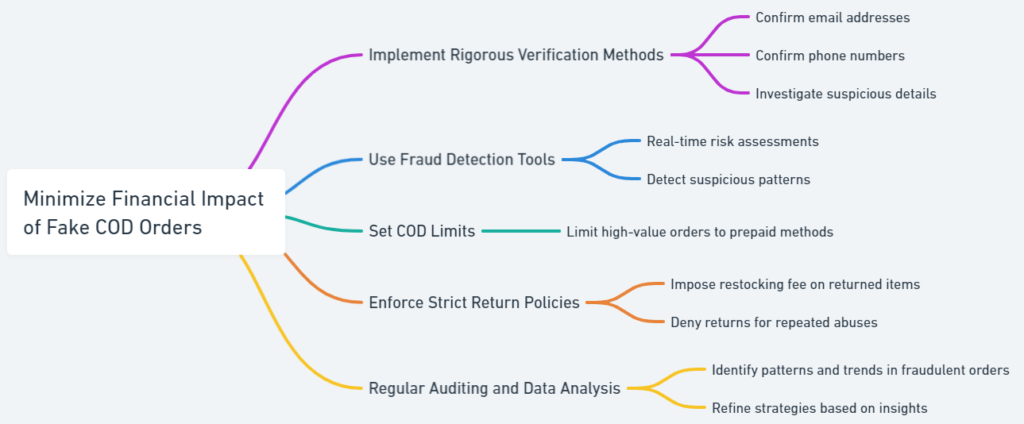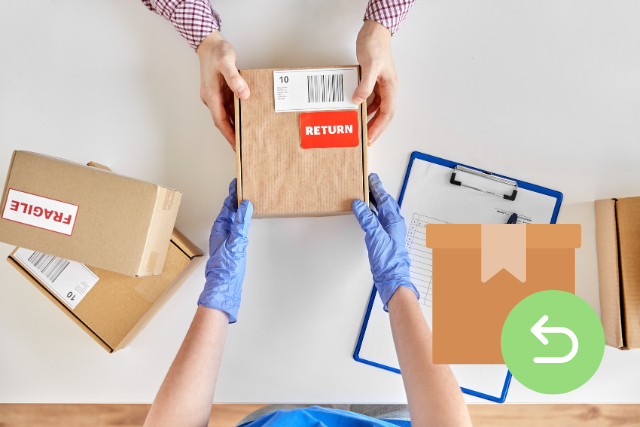Operating an online store expands your reach to global customers. But, along with its myriad benefits, it brings its challenges. One such significant hurdle is fraudulent Cash on Delivery (COD) orders.
These fake orders can cause substantial financial and operational damage to your online business. This article will provide a detailed guide on protecting your online store from fake COD orders.
Table of Contents
Understanding Fake COD Orders
The first step is to understand what fake COD orders are. In simple terms, these orders are those where a customer places an order online, opts for COD, but never pays up.
They might provide false contact details, an incorrect address, or refuse to accept the delivery. This leaves your business bearing unnecessary costs and losses.
Impact of Fake COD Orders
Fake COD orders can be far-reaching, affecting businesses, customers, and delivery partners. Here are some of the key consequences of fake COD orders:
1. Financial Losses for Businesses
Fake COD orders lead to financial losses for businesses in several ways:
- Inventory holding costs: When products are returned due to fake orders, businesses incur additional costs for holding and managing the inventory.
- Shipping and handling costs: Businesses have to bear the shipping and handling costs for both the delivery and return of the products.
- Restocking fees: In some cases, businesses may have to pay restocking fees to suppliers or manufacturers for returned products.
2. Reduced Operational Efficiency
Fake COD orders can lead to inefficiencies in the order fulfilment process. Businesses must spend time and resources processing returns, which can slow down the overall order fulfilment process and negatively impact customer satisfaction.
3. Strained Relationships with Delivery Partners
Delivery partners may face increased operational costs and reduced efficiency due to fake COD orders. This can strain relationships between businesses and their delivery partners, potentially leading to higher delivery fees or reduced service levels.
4. Negative Impact on Customer Trust
Customers who experience delays or other issues due to fake COD orders may lose trust in the e-commerce platform or the seller. This can lead to reduced customer loyalty and lower repeat purchase rates.
5. Increased Prices for Genuine Customers
To offset the financial losses caused by fake COD orders, businesses may have to increase product prices or shipping fees. This can make shopping online less attractive for genuine customers, potentially driving them to shop elsewhere.
6. Stricter Payment Policies
In response to fake COD orders, businesses may implement stricter payment policies, such as requiring pre-payment for certain products or limiting the availability of COD as a payment option. While this can help reduce the risk of fake orders, it may also inconvenience genuine customers who prefer COD.
7. Legal and Regulatory Consequences
In some cases, fake COD orders may involve fraudulent activities, such as identity theft or the use of stolen credit card information. This can lead to legal and regulatory consequences for the perpetrators and the businesses involved.
To mitigate these effects, businesses should invest in robust fraud detection and prevention systems, maintain strong relationships with delivery partners, and implement customer-friendly policies that balance risk and convenience.

Strategies to Shield Your Online Store from Fake COD Orders
From basic customer verification to leveraging advanced technologies and regular auditing, these methods aim to make your COD transactions secure and profitable. Let’s take a closer look.
Verification of Details
The first line of defence against fraudulent COD orders is verifying customer details. When placing an order, make it mandatory for customers to provide their contact information, including email and phone number.
Following this, initiate an automatic confirmation process, which could be through a verification email or a phone call. The process should be swift and efficient, ensuring it does not hinder the overall customer experience. Even though this approach might seem basic, it’s quite effective in screening out potential fraudsters who provide false contact details.
COD Verification Services
Taking a step further, you can leverage COD Verification Services. Several third-party services are available that specialize in this area. These services are powered by advanced technologies, like machine learning algorithms, which analyze numerous data points from order details and predict the likelihood of a fraudulent order.
Incorporating such services into your fraud prevention framework can aid you in making more informed decisions and shield your business from potential losses due to fake COD orders.
COD Option for Regular Customers
Another worthwhile strategy is to reserve the COD option for your regular customers. These customers have a record of successful transactions, making them less likely to place fraudulent orders.
Limiting COD to such trustworthy customers can considerably reduce the risk of fake orders while still offering the convenience of COD to a segment of your customer base.
Customer Rating System
A customer rating system based on transaction history can be an effective deterrent against fake COD orders. Such a system can be used to rank customers on their reliability.
Customers with consistently successful transactions (no history of failed deliveries or non-payments) earn higher ratings. These customers can enjoy a broader range of payment options, including COD. Lower-rated customers, on the other hand, may be limited to prepaid methods, reducing the risk of losses due to COD fraud.
Setting COD Limits
Setting COD limits can be another effective strategy. Under this, you set a cap on the value of orders that can be placed using COD. For instance, any order above a certain amount would require prepaid methods.
This strategy minimizes the risk associated with high-value orders and encourages customers to opt for prepaid methods, thereby reducing the overall proportion of COD orders.
Partial Prepayment for COD
Partial prepayment for COD orders is another strategy that’s gaining traction. Under this approach, customers opting for COD for high-value orders must make a small prepayment.
This serves a dual purpose – it confirms the customer’s intention to purchase and reduces your financial risk by ensuring you recover at least a portion of the costs in case of a failed delivery.
Strict Return Policies
Implementing strict return policies for COD orders is another preventive measure against fake orders. For example, you could impose a restocking fee for returned COD orders or deny returns in the case of repeated abuses.
This discourages customers who order to return and creates an additional financial barrier to fraudulent behaviour.
Training Delivery Personnel
Delivery personnel are your last line of defence against COD fraud. They are the ones on the ground, and with the right training, they can identify potential signs of COD fraud, such as incorrect addresses or refusal of delivery.
Regular training programs highlighting these red flags and the appropriate steps to take when faced with a suspected fraudulent order can empower your delivery staff and contribute to your overall fraud prevention efforts.

Regular Auditing
Lastly, auditing your order data regularly can help you identify patterns and commonalities among fake COD orders. These insights can guide you in refining your prevention measures and plug loopholes that fraudsters may exploit.
Regularly reviewing your policies and strategies in line with these insights ensures your online store remains a step ahead in the fight against COD fraud.

How to Identify Fake COD Orders
Recognizing fake Cash on Delivery (COD) orders is paramount to safeguarding your online store from fraudsters. Despite the challenges, certain signs and protective measures can significantly assist these efforts. Let’s delve deeper into this issue.
Red Flags to Look Out For
Bogus COD orders often reveal themselves through a series of red flags. The following warning signs can help you stay a step ahead of fraudsters:
- Incomplete or Suspicious Contact Information: Often, fraudulent orders come with sketchy contact details. An order where the provided address is non-existent, or the given phone number is unreachable, is a significant warning sign. Additionally, be wary of orders placed without an email address or using a temporary email service.
- Recurring IP Addresses: In eCommerce, identifying recurring IP addresses is a potent tool against fraud. Suppose you notice multiple orders placed from the same IP address quickly. Investigating further is a good idea, especially if they use different names or contact details.
- Unusual Order Behavior: This could mean orders for high-value items or large quantities, especially from new customers or those without a history of similar purchases. A sudden shift in buying behaviour might indicate a potential fake COD order.
Implementing a Fraud Detection System
While vigilant about these warning signs is crucial, managing this manually can be labour-intensive and prone to error. Implementing an automated fraud detection system can dramatically streamline the process.
Advanced fraud detection systems use algorithms to analyze various data points from an order and assess the likelihood of it being fraudulent. These systems can identify suspicious patterns more efficiently than manual checks, flagging potential fake COD orders for further review.
By being proactive and implementing a comprehensive fraud detection system, you can significantly reduce the risk of fake COD orders, thereby protecting your online store and ensuring its sustainability and profitability.
Frequently Asked Questions
What is a fake Cash on Delivery (COD) order?
A fake COD order occurs when a customer places an order with no intention of paying for the product upon delivery. This can lead to financial losses for businesses, strained relationships with delivery partners, and negative impacts on customer trust.
Will implementing stricter payment policies deter genuine customers?
While stricter payment policies can help reduce the risk of fake COD orders, they may inconvenience genuine customers who prefer COD. To strike a balance, consider offering alternative payment options, such as digital wallets or instalment plans, that provide both convenience and security.
How can I maintain customer trust while implementing measures to prevent fake COD orders?
Maintaining customer trust is crucial when implementing fraud prevention measures. Be transparent about your policies, provide clear communication about any changes, and offer exceptional customer support to address concerns and questions. You can build trust and loyalty by demonstrating your commitment to protecting customers and providing a secure shopping experience.
Can legal action be taken against individuals who place fake COD orders?
In cases where fake COD orders involve fraudulent activities, such as identity theft or the use of stolen credit card information, legal action may be taken against the perpetrators. However, pursuing legal action can be time-consuming and costly, so focusing on prevention and risk mitigation is often a more effective approach.
How can I identify fake COD orders?
Identifying fake COD orders involves recognizing certain red flags such as incomplete or suspicious contact information, multiple orders from the same IP address within a short period, and unusual purchasing behaviours like sudden high-value orders from new customers. Implementing a fraud detection system can automate identifying these signs, helping protect your online store from potential fraud.
Conclusion
Running an online store comes with its fair share of challenges. Fake COD orders can be particularly damaging. But remember, with the right procedures and tools; you can minimize your risk and protect your business.
The goal is not to eliminate COD, as many customers prefer it. It’s about managing the risks associated with COD, so you can continue offering it as a safe and convenient payment option.
As always, these are general guidelines. Before implementing new policies, please consult with a business or legal advisor to ensure they comply with local regulations and are appropriate for your business model.







